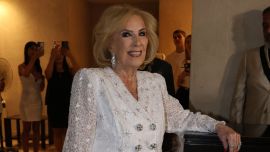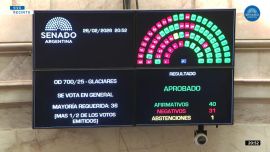Argentina will pay for Chinese imports in yuan instead of US dollars in order to preserve its dwindling foreign reserves, Economy Minister Sergio Massa announced on Wednesday.
The country will be able to "programme a volume of imports in yuan worth [the equivalent of] more than US$1 billion from next month," Massa said at a meeting in Buenos Aires with China's ambassador Zou Xiaoli.
This would "replace" the use of Argentina's US dollar reserves for commercial operations with the Asian giant, said the minister in a televised broadcast with China’s Ambassador to Argentina, Zou Xiaoli.
Beijing and Buenos Aires already had a currency swap deal in place that Argentina could resort to in case of emergency.
Argentina has been suffering from financial turbulence in the past two weeks, prompting the Central Bank to intervene in the currency markets.
President Alberto Fernández on Tuesday accused the country's right-wing opposition of fuelling a dramatic erosion of the peso against the dollar, and Massa ordered an investigation into alleged wrongdoing and money-laundering.
The peso stood at 227 to the dollar at the official exchange rate Tuesday, but reached more than double that, nearing 500 per greenback, on the parallel "dólar blue" market.
The slide started last week after several days of pressure on the peso in a period of pre-election uncertainty. Argentina has strict currency controls in place to limit the effects of a financial crisis and rampant inflation of 104 percent year-on-year.
The government is hoping that paying Chinese imports in yuan from its second-largest trading partner will allow it to weather the storm that is trimming its reserves.
Resorting to the swap "gives us greater freedom, it gives us more capacity to operate from the Central Bank,” said Massa.
He said the institution had been forced to intervene “against those who, thinking that we did not have the economic capacity as a state, speculated and over-speculated."
Argentina’s US$44.5-billion debt programme with the International Monetary Fund limits interventions in foreign exchange markets and sets targets for the accumulation of Central Bank reserves.
"This challenge forces us and the IMF to rethink the credit agreement," warned Massa in a speech watched by several local business leaders.
Argentina's international reserves stood at US$36.47 billion on Monday, according to the Central Bank, but analysts believe liquid net reserves are significantly lower. The figure was US$44.608 billion last January 2.
Reserves are under constant pressure in Argentina, where the dollar is a safe haven for the general population and companies in the face of high inflation. Economist Maria Castiglioni told the TN broadcaster the devaluation was partly the result of Argentines seeking "refuge" in the US dollar to protect their purchasing power.
Massa said the deal to pay in yuan would "improve the perspective of Argentina's net reserves." It also "allows us to maintain the level of activity, the volume of imports, the pace of trade between Argentina and China and the levels of economic functioning that Argentina needs" following a poor year for domestic agriculture, and thus exports, amid persistent drought, he added.
Speaking on Wednesday to the press, Ambassador Xou stressed the importance of the swap as a financial instrument to "protect and develop global markets by supporting companies so that they can use local currencies to settle trade."
The world's second-largest economy and a major political rival of the United States, China has been internationalising its currency for years. Brazilian President Luiz Inácio Lula da Silva recently signed an agreement in Beijing to trade in yuan and reals.
The greenback currently accounts for 42 percent of currency used for international trade, compared to 33 percent for the euro, six percent for the British pound, five percent for the yen and just two percent for the yuan, according to recent data from the Swift international payment system.
– TIMES/AFP
related news

Argentine stocks are left behind as earnings growth eludes Milei

IDB study: Uber drivers in Latin America are educated men earning US$7 per hour

Argentina Week: Milei takes governors to Wall Street in investment drive





















Comments